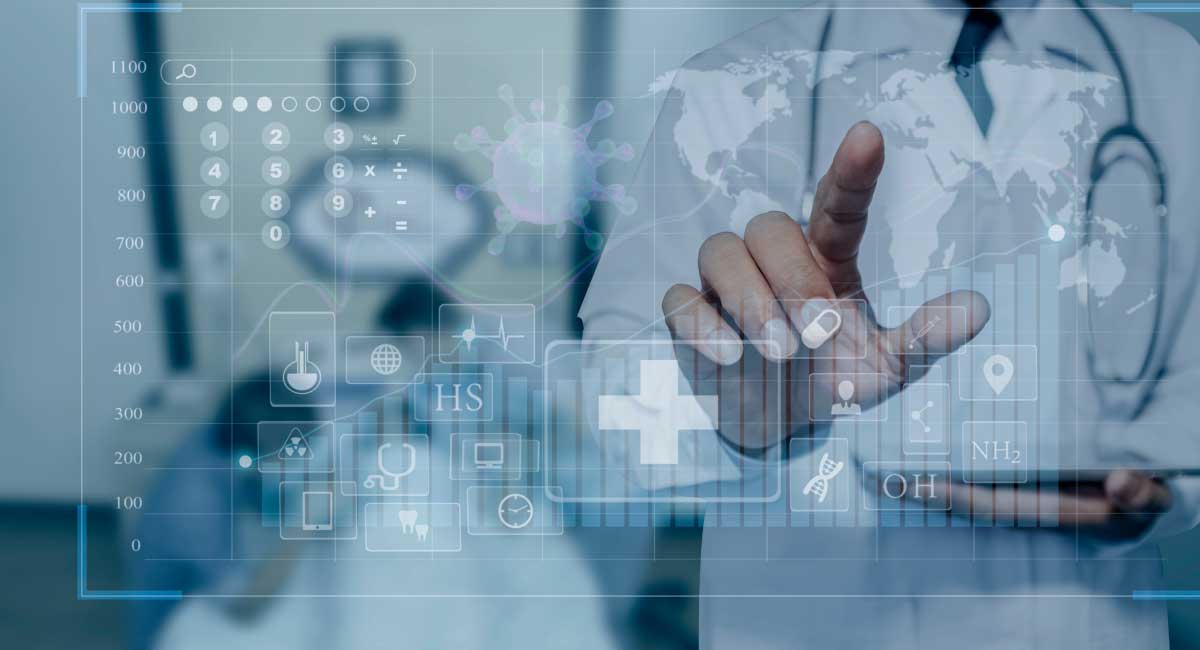The healthcare industry is a powerful, far-reaching institution in our modern world, and data science plays an increasingly more prominent role in everyday operations. This article tackles the issue of data science in healthcare, including the need for it, applications, roles, and advantages.
Furthermore, we will discuss how to become a healthcare data scientist through an excellent online data science program, including what companies hire the most data scientists today.
The Need for Data Science in Healthcare
Quality healthcare thrives on accurate information. Each human body and its operations generate reams of data, and data science helps professionals handle these vast volumes of information and use them to make better decisions, handle huge numbers of patients, and even predict diseases while they’re in their early stages. Data science also helps healthcare providers monitor patients’ conditions remotely, eliminating distance as a factor.
Physicians, healthcare providers, hospitals, and even health insurance providers need the power of data science to help sort through terabytes of patient data and determine the best courses of action. Wearable devices such as heart monitors become easier to work with when an experienced, professional data scientist is involved, allowing constant data streams to be collected, processed, and analyzed.
To that end, let’s look at some typical uses of data science in healthcare.
What are Some Common Applications of Data Science in Healthcare?
Data science is already proving its value and versatility in the healthcare field. Machine learning and data analytics are revolutionizing the healthcare industry, from pharmaceuticals to patient care. Note that some of these applications overlap, as many use the same technology and processes.
Predictive analytics
Predictive analytical models find patterns from historical data and use them to generate accurate predictions. The data could cover anything from the patient’s body temperature and blood pressure to glucose levels. Predictive models in data science can correlate and link every data point to the patient’s habits, symptoms, and past diseases. This correlation allows for identifying a disease’s stage, how much damage it’s doing, and appropriate treatments. Predictive analytics in healthcare also can:
- Manage chronic diseases
- Monitor and analyze pharmaceutical logistics demand
- Predict a future patient crisis
- Quickly deliver faster hospital data documentation
Wearable devices
Data science has tremendously benefitted from the explosion of the Internet of Things (IoT for short), ensuring optimum connectivity. When IoT technology is applied to the medical field, it makes monitoring a patient’s health easier. For example, people use smartwatches and physical fitness monitors to track and manage their weight, vitals, and activities. Additionally, doctors can track these wearable sensor devices if given access, and in long-term cases, the doctor can remotely offer advice and solutions to the patient.
Tracking a patient’s health
According to statistics, the human body generates 2TB of data daily. Talk about big data! Consequently, data scientists for public health have perfected wearable devices that let doctors collect much of this data, like weight, blood pressure, stress levels, heart rate, sleep patterns, blood glucose, and even brain activity. Thanks to data science tools and machine learning algorithms, doctors can spot and monitor common chronic conditions, such as cardiac or respiratory diseases. Data Science technology can also detect the slightest variations in a patient’s health indicators and anticipate potential disorders. Wearable and home devices connected to an IoT network can use real-time analytics to predict if a patient may face a problem based on their current condition.
Discovering new drugs
Data science helps the pharmaceutical industry by using artificial intelligence to lay the groundwork for synthesizing drugs. Mutation profiling and patient metadata are used to develop compounds dealing with statistical correlations between attributes.
Virtual assistants
Data scientists are designing chatbots and artificial intelligence platforms to help patients better understand their health. Patients can enter certain health information about themselves and get an accurate diagnosis. Additionally, these platforms help consumers with health insurance policy questions and provide guides to better lifestyles.
Medical image analysis
Healthcare professionals typically use imaging techniques like MRI, X-ray, and CT scans to visualize a body’s internal systems and organs. Deep learning and image recognition technologies can detect minor deformities in these scanned images, which can help doctors plan effective treatment strategies. Typical machine learning algorithms include:
- Image processing algorithms for image analysis, enhancement, and denoising
- Anomaly detection algorithms for bone fracture and displacement detection
- Descriptive image recognition algorithms for data extraction and interpretation from these images and combining several images to create a bigger picture
The Roles and Responsibilities of Data Scientists in Healthcare
Here is a partial list of the primary responsibilities that certified data scientists face when working in the healthcare field:
- Managing massive volumes of data. This role entails taking a large quantity of data and compressing, sorting, and converting it into smaller, easier-to-use packets ideal for non-technical colleagues to use. This responsibility also includes collecting data from hospitals, health centers, and pharmaceutical companies.
- Preparing reports and dashboards, then presenting the findings to the correct authorities responsible for the organization’s overall management
- Extracting insights from data using algorithms
- Analyzing hospital needs in the context of equipment requirements
- Managing medical databases. Data scientists must not only retrieve information by finding it in data storage but also keep it secure against potential breaches or intrusions
- Working with the development team to build predictive models
Advantages Of Data Science in Healthcare
Data science brings a lot of advantages to the healthcare field, such as:
- Reducing treatment failures. Perhaps the most critical use of data science in healthcare is to use accurate predictions and prescriptions to minimize errors in treatment. Because data scientists collect significant information about the patient’s medical history, stored data can be used to identify disease symptoms and offer an accurate diagnosis. And since treatment options can be personalized, and more information is available for patient care, mortality rates can drop significantly.
- Facilitating drug development. Drug development demands time and intensive research. However, medical data science can reduce both the time and effort required. Machine learning algorithms can predict if a new drug will produce the desired effect on a human body by using prior medical data, case study reports, lab testing outcomes, and how the drugs perform during clinical trials.
- Developing a specialized skill set. Developing skillsets that can provide an accurate diagnosis to administer quality treatment is essential. By using predictive analytics, healthcare professionals can predict which patients pose higher risks and know when and how to intervene early to prevent severe damage.
- Reducing healthcare expenses. This advantage is particularly welcome in the face of rising medical costs. Healthcare data science specialists can use Electronic Health Records (EHRs) to identify patient health patterns and prevent unnecessary treatments or hospital stays, thus reducing costs.
- Here are a few additional advantages:
- Mitigating the risks of treatment failure
- Reducing patient wait times
- Easing the healthcare system’s workflow
- Providing timely, proper treatments
- Avoiding unnecessary emergencies due to a lack of doctors on-call
How to Become a Healthcare Data Scientist in 2024
If the healthcare data scientist profession sounds good, here is how you can become one in the coming year.
- Foster a strong foundation in mathematics and statistics. Focus your studies on critical areas such as probability, calculus, linear algebra, and statistical inference. These subjects form the essential underpinnings of data science.
- Earn a bachelor’s degree. Make sure to cover your academic bases. Consider earning a bachelor’s degree in a field closely related to data science, such as computer science, mathematics, statistics, or a healthcare-related field. This educational path will give you a solid academic background for becoming a data scientist in healthcare. But your time in academia is ongoing, as we’re about to see.
- Consider advanced education. Consider pursuing a master’s degree or Ph.D. in fields like biomedical informatics, health informatics, data science, or a related discipline. Advanced degrees offer specialized knowledge and research opportunities that will undoubtedly look good on a resume or CV!
- Get proficient in programming. Focus on gaining proficiency in programming languages typically utilized in data science, like Python or R. These languages are used heavily for data-related tasks like data manipulation, analysis, and modeling. In addition, familiarize yourself with available healthcare-specific libraries and frameworks such as PyTorch or TensorFlow since they are specifically designed to cater to healthcare data science needs.
- Get familiar with healthcare domain knowledge. Learn everything about the healthcare industry, including regulations, terminology, and data sources. Also, understand clinical trials, electronic health records (EHRs), medical coding systems, and healthcare analytics.
- Acquire practical skills by participating in projects. Immerse yourself in practical projects related to healthcare data analysis. This process could mean conducting research studies, working with publicly accessible healthcare datasets, or collaborating with various healthcare organizations. If you undertake such hands-on initiatives, you construct a portfolio that shows your proficiency and capabilities in handling healthcare data proficiently.
The Healthcare Companies Hiring the Most Data Scientists
The following healthcare companies regularly hire data scientists. For additional leads, check out sites such as LinkedIn or ZipRecruiter.
- Anthem, Inc.
- AstraZeneca
- Cigna
- Eli Lilly and Company
- Johnson & Johnson
- Merck & Co.
- NovaSignal
- Novartis
- Pfizer
- Roche Holding AG
- UnitedHealth Group
The Future of Data Science in Healthcare
The future of data science in healthcare looks bright. Data science techniques and technologies can improve patient outcomes, drive medical advancements, and revolutionize the healthcare industry.
Thanks to the growing access and availability of healthcare data such as genomics, wearables, medical imaging, and electronic health records, data science can facilitate more personalized medicine, early disease detection, predictive analytics, precision diagnostics, and optimized treatment.
Machine learning algorithms and artificial intelligence also help in drug discovery, clinical decision-making, and medical research. Data-driven approaches can also improve healthcare operations, population health management, and resource allocation.
If this future sounds like something you want to be a part of, let’s look at something that can help you become a healthcare data scientist.
Do You Want to Become a Data Scientist in the Healthcare Field?
There are many programs available that can help you make your dreams of becoming a healthcare data scientist come true. Consider this data science program that teaches valuable data science and generative AI skills with a six-month program featuring applied learning and over two dozen projects.
You can also consider this data science bootcamp. This intense, 24-week bootcamp will expose you to ChatGPT, DALL-E, Midjourney, and many other prominent tools.
According to Glassdoor.com, a healthcare data scientist can earn an annual average of $131,331. So, if you’re looking for a secure, well-paying career that gives you the chance to help people, consider studying to become a data scientist in healthcare!
FAQ
Q: How is data science used in healthcare?
A: Data science helps healthcare professionals with diagnostics, pharmaceutical research, remote patient monitoring, wearable device monitors, and predicting the possibility of disease or other detrimental conditions.
Q: What is the future scope of data science in healthcare?
A: Data makes the world go round, and there will always be a demand for healthcare-related services. Expect data science to continue making inroads into every aspect of the healthcare industry.
Q: Is health data science a good career?
A: Yes. Data science is used in many aspects of our lives, and the healthcare industry is booming.
Q: Can a data scientist work in a hospital?
A: There’s no reason why, in some cases, a data scientist can’t work in a hospital. Much of it relies on the facility and the position itself.
Q: What is the difference between a healthcare data scientist and a data scientist?
A: The difference boils down to how the data is used. Data science has more options in various fields and industries, while a healthcare data scientist specializes in working with healthcare professionals and organizations.






